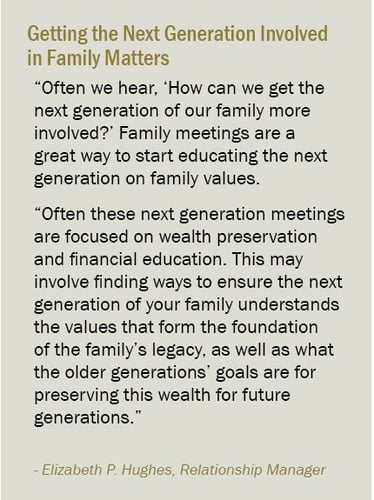4 min read
How to Know When It's Time for a Family Meeting
 Elizabeth P. Hughes, J.D., Relationship Manager, Commerce Family Office
:
May 26, 2022 7:00:00 AM
Elizabeth P. Hughes, J.D., Relationship Manager, Commerce Family Office
:
May 26, 2022 7:00:00 AM

No one likes unwelcome surprises. Yet when it comes to talking with family members about protecting their wealth and transferring assets once they die, most individuals choose to avoid or postpone important conversations that could help them avoid those stressful situations.
Obviously, deciding when and how to bring family members together for a wealth planning discussion is a very personal – and often difficult – decision. Ideally, not only should you want to share your vision and wishes for how your wealth will be distributed, but also you should want to have family members involved in conversations regarding your money’s impact on their lives and favorite philanthropic causes.

You may want to consider the following suggestions for when and how to bring the next generations of your family together to learn about your wishes and long-term goals for your wealth – and to discuss their roles and responsibilities in your legacy planning strategy.
When to have a family meeting
Even successful families experience conflict – especially where money is concerned. Negative feelings can be detrimental to family relationships if they are not addressed and managed. Remember, family conflict is natural – everyone is entitled to their opinion and should be allowed to express it. For families that approach this conflict intentionally and respectfully, the experience can provide learning and growth opportunities for all individuals involved in the process.
For generations, families have wrestled with finding suitable answers to the question, “How can we get the next generation more involved?” Many have discovered family meetings are a great place to start educating the next generation on family values.
Family councils. Some families create a family council consisting of family members from each generation. Members of the council often help create a family charter or family mission statement. Family councils can help plan family meetings to discuss broad family issues and plan fun family outings.
Family foundations. Others view family meetings as a time to involve loved ones in their family foundation. For many individuals, it’s important to them that the younger generations get involved earlier rather than later in life. Often heirs to the family wealth sit in on family foundation board meetings for a couple of years before officially joining the board. This allows the younger generations to learn about the family foundation, its history, and the charities it supports before becoming a board member.
Family business shareholders’ meetings. For family members who are not working for the family business, annual shareholders’ meetings are important. These meetings are a way to make them feel part of the business even though they are not involved in the operations on a daily basis. This is even more crucial when family members are spread throughout the U.S. and live in different cities or states from where the operating business is located. If your governing documents don’t provide for such participation, consider amending them to allow the younger generation to attend those annual meetings as a learning experience.
Next generation education. Sometimes, next generation meetings can be more focused on wealth preservation and financial education. This may involve educating future generations to help them understand the values that form the foundation of the family’s legacy, as well as what the older generations’ goals are for preserving their wealth for future generations.
How to have a family meeting
Finally, it’s not at all uncommon to arrange family meetings simply to bring loved ones together.
You want to create a space in which each generation feels able to communicate how they are feeling and that the rest of the family is listening to them. Often younger family members think no one listens to their ideas or their ideas are easily dismissed.
Here are a few more tips to consider:
⦁ Sometimes it can be beneficial to separate out into groups and let family members who are part of the next generation meet as one group.
⦁ You might choose to invite an independent third party (outside the family) to participate in these meetings and help facilitate conversation.
⦁ Plan a meeting at a location away from where family members live. This allows for more family time if everyone is staying at the same hotel or location – and family members may not be as easily distracted with their “regular life” when they are away from home.
Next steps
We here at Commerce Trust have participated in all kinds of family gatherings, from shareholder and foundation meetings to wealth education presentations on general business structures (e.g., LLCs, partnerships, corporations, taxation) and basic financial topics (e.g., investments, budgeting, cash flow) for the next generation. Additionally, we have attended beneficiary meetings with trustees to discuss estate planning basics, the different types of trusts, taxation of trusts, and review the trust terms and assets in trust for the beneficiary’s benefit.
As we mentioned earlier, when the timing is right for your family meeting, it can be beneficial to have an independent third party (outside the family) participate in the event and help facilitate the conversation. Your Commerce Trust team of professionals is here to guide your family toward achieving their long-term goals. Contact us today for more information on legacy planning.
Obviously, deciding when and how to bring family members together for a wealth planning discussion is a very personal – and often difficult – decision. Ideally, not only should you want to share your vision and wishes for how your wealth will be distributed, but also you should want to have family members involved in conversations regarding your money’s impact on their lives and favorite philanthropic causes.

You may want to consider the following suggestions for when and how to bring the next generations of your family together to learn about your wishes and long-term goals for your wealth – and to discuss their roles and responsibilities in your legacy planning strategy.
When to have a family meeting
Even successful families experience conflict – especially where money is concerned. Negative feelings can be detrimental to family relationships if they are not addressed and managed. Remember, family conflict is natural – everyone is entitled to their opinion and should be allowed to express it. For families that approach this conflict intentionally and respectfully, the experience can provide learning and growth opportunities for all individuals involved in the process.
For generations, families have wrestled with finding suitable answers to the question, “How can we get the next generation more involved?” Many have discovered family meetings are a great place to start educating the next generation on family values.
Family councils. Some families create a family council consisting of family members from each generation. Members of the council often help create a family charter or family mission statement. Family councils can help plan family meetings to discuss broad family issues and plan fun family outings.
Family foundations. Others view family meetings as a time to involve loved ones in their family foundation. For many individuals, it’s important to them that the younger generations get involved earlier rather than later in life. Often heirs to the family wealth sit in on family foundation board meetings for a couple of years before officially joining the board. This allows the younger generations to learn about the family foundation, its history, and the charities it supports before becoming a board member.
Family business shareholders’ meetings. For family members who are not working for the family business, annual shareholders’ meetings are important. These meetings are a way to make them feel part of the business even though they are not involved in the operations on a daily basis. This is even more crucial when family members are spread throughout the U.S. and live in different cities or states from where the operating business is located. If your governing documents don’t provide for such participation, consider amending them to allow the younger generation to attend those annual meetings as a learning experience.
Next generation education. Sometimes, next generation meetings can be more focused on wealth preservation and financial education. This may involve educating future generations to help them understand the values that form the foundation of the family’s legacy, as well as what the older generations’ goals are for preserving their wealth for future generations.
How to have a family meeting
Finally, it’s not at all uncommon to arrange family meetings simply to bring loved ones together.
You want to create a space in which each generation feels able to communicate how they are feeling and that the rest of the family is listening to them. Often younger family members think no one listens to their ideas or their ideas are easily dismissed.
Here are a few more tips to consider:
⦁ Sometimes it can be beneficial to separate out into groups and let family members who are part of the next generation meet as one group.
⦁ You might choose to invite an independent third party (outside the family) to participate in these meetings and help facilitate conversation.
⦁ Plan a meeting at a location away from where family members live. This allows for more family time if everyone is staying at the same hotel or location – and family members may not be as easily distracted with their “regular life” when they are away from home.
Next steps
We here at Commerce Trust have participated in all kinds of family gatherings, from shareholder and foundation meetings to wealth education presentations on general business structures (e.g., LLCs, partnerships, corporations, taxation) and basic financial topics (e.g., investments, budgeting, cash flow) for the next generation. Additionally, we have attended beneficiary meetings with trustees to discuss estate planning basics, the different types of trusts, taxation of trusts, and review the trust terms and assets in trust for the beneficiary’s benefit.
As we mentioned earlier, when the timing is right for your family meeting, it can be beneficial to have an independent third party (outside the family) participate in the event and help facilitate the conversation. Your Commerce Trust team of professionals is here to guide your family toward achieving their long-term goals. Contact us today for more information on legacy planning.
The opinions and other information in the commentary are provided as of May 26, 2022. This summary is intended to provide general information only, and may be of value to the reader and audience.
This material is not a recommendation of any particular investment or insurance strategy, is not based on any particular financial situation or need, and is not intended to replace the advice of a qualified tax advisor or investment professional. While Commerce may provide information or express opinions from time to time, such information or opinions are subject to change, are not offered as professional tax, insurance or legal advice, and may not be relied on as such.
Commerce does not provide tax advice or legal advice to customers. Consult a tax specialist regarding tax implications related to any product and specific financial situation.
Data contained herein from third-party providers is obtained from what are considered reliable sources. However, its accuracy, completeness or reliability cannot be guaranteed.
Commerce Trust is a division of Commerce Bank.
Not FDIC Insured / May Lose Value / No Bank Guarantee
